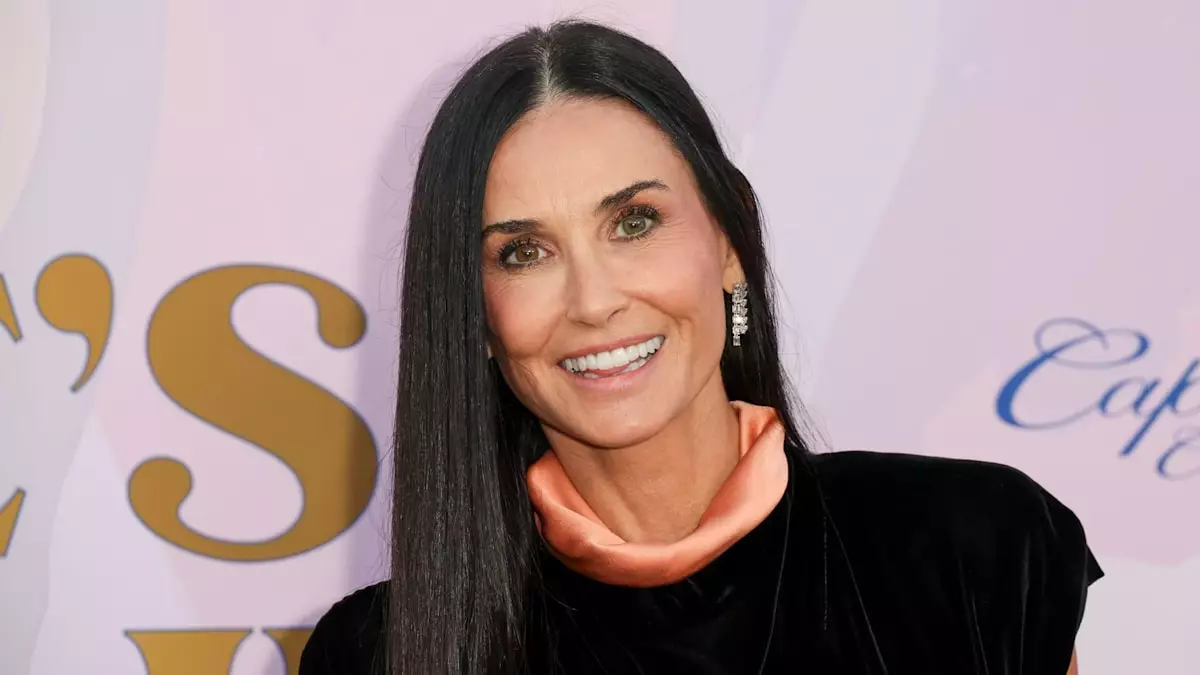Demi Moore, a name synonymous with resilience and bravery, recently opened up about her tumultuous journey through the unforgiving landscape of Hollywood. At 62 years old, Moore has not shied away from discussing the deep-seated pressures that led her to battle with personal demons, particularly an eating disorder that endangered her well-being and self-esteem. In a revealing interview with Elle, she provides insight into the relentless scrutiny she faced as a young actress, while also highlighting her path towards self-acceptance and inner peace.
In her candid recollection, Moore shares a painful episode from her career when she was repeatedly urged to “lose weight” for a role. Such comments, delivered in a casual manner by industry elites, underscore a harsh reality faced by many female actors. These are not just passing remarks; they can become defining moments that shape an individual’s perceptions of themselves. Moore recalls an instance when a producer personally advised her on her appearance, a moment that she later recognized as a catalyst for a significant internal struggle. “I internalized it,” she noted, reflecting the common predicament of allowing external opinions to dictate one’s self-worth. The immense pressure led her to engage in extreme behaviors that significantly altered her relationship with her body.
Moore’s acknowledgment of this trauma is not merely a retrospective lament; it serves as a stark reminder of the industry’s unrealistic beauty standards and the high price many women pay to conform. Such pressures can lead to an unhealthy fixation on appearance, ultimately overshadowing the talents and contributions that define an artist’s worth.
Within the myriad of challenges, there was a pivotal moment in 1997 that brought clarity to Moore’s tumultuous journey. It was a realization that she did not need to fit into a prescribed mold but instead could embrace her natural size and identity. This epiphany marked a crucial turning point in her life, yet the road to acceptance remained fraught with hurdles.
As Moore navigated her career, aging became yet another adversary. The entertainment industry is notoriously unkind to its aging stars—leaving many feeling obsolete. She articulated the struggle of existing in a marginal space, neither fitting the youthful archetype nor the clichés associated with older actresses. “I didn’t quite know where I fit, and that wasn’t something I made up; it was something I was told,” she remarked, emphasizing how external validation can impede one’s journey towards self-discovery.
Finding Peace and Gratitude
Despite the overwhelming challenges, Moore radiates an aura of gratitude. She expresses amazement that she continues to thrive in an industry that often seeks to sideline older actresses. This sense of achievement is not merely a result of remaining relevant but embodies her profound love for acting—a profession that allows her to share her story and resonate with others.
Her latest role in “The Substance” exemplifies this enduring passion. Despite initial unease regarding the film’s demands, including a full-frontal scene, Moore chose to embrace her vulnerability. She approached the project with a sense of purpose, understanding that exposing her insecurities could facilitate critical conversations surrounding the pressures faced by older women in society. “It felt like any exposure of my insecurities would be worth it if I was part of bringing forward the conversation,” she shared, illustrating her transformation from seeking external validation to prioritizing her own values.
Moore’s journey is a powerful testament to resilience and self-acceptance. Through triumphs and tribulations, she has evolved from someone who often sought validation from others into a figure of empowerment for women, inspiring them to acknowledge and own their insecurities. Her commitment to embracing her true self serves as a luminous guide for those navigating their paths through societal pressures and personal battles.
In exploring her vulnerabilities, Demi Moore not only reclaims her narrative but also paves the way for dialogues about authenticity, beauty standards, and the enduring strength of women. Her journey illustrates that true worth transcends external judgments, and the courage to define oneself by personal standards is indeed a transformative power.

